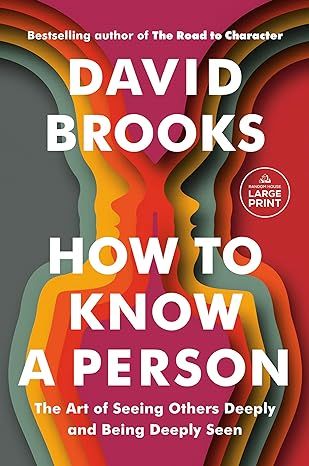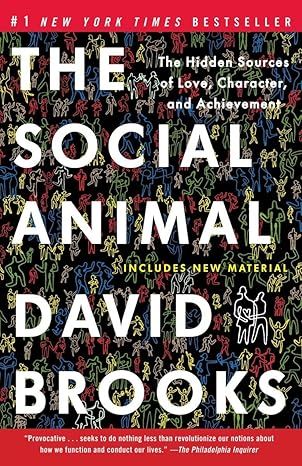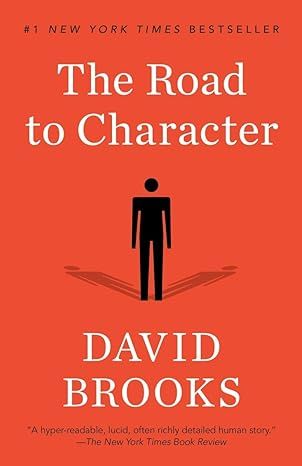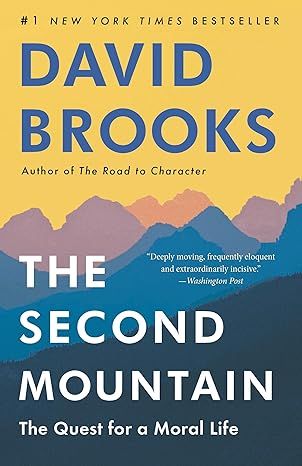How to Know a Person: The Art of Seeing Others Deeply and Being Deeply Seen (Random House Large Print)
4.6 out of 5
3,831 global ratings
NEW YORK TIMES BESTSELLER • A practical, heartfelt guide to the art of truly knowing another person in order to foster deeper connections at home, at work, and throughout our lives—from the author of The Road to Character and The Second Mountain
“More than a guide to better conversations, it’s a blueprint for a more connected and humane way of living. It’s a must-read for anyone looking to deepen their relationships and broaden their perspectives.”—Bill Gates, GatesNotes (Summer Reading Pick)
As David Brooks observes, “There is one skill that lies at the heart of any healthy person, family, school, community organization, or society: the ability to see someone else deeply and make them feel seen—to accurately know another person, to let them feel valued, heard, and understood.”
And yet we humans don’t do this well. All around us are people who feel invisible, unseen, misunderstood. In How to Know a Person, Brooks sets out to help us do better, posing questions that are essential for all of us: If you want to know a person, what kind of attention should you cast on them? What kind of conversations should you have? What parts of a person’s story should you pay attention to?
Driven by his trademark sense of curiosity and his determination to grow as a person, Brooks draws from the fields of psychology and neuroscience and from the worlds of theater, philosophy, history, and education to present a welcoming, hopeful, integrated approach to human connection. How to Know a Person helps readers become more understanding and considerate toward others, and to find the joy that comes from being seen. Along the way it offers a possible remedy for a society that is riven by fragmentation, hostility, and misperception.
The act of seeing another person, Brooks argues, is profoundly creative: How can we look somebody in the eye and see something large in them, and in turn, see something larger in ourselves? How to Know a Person is for anyone searching for connection, and yearning to be understood.
432 pages,
Kindle
Audiobook
Hardcover
Paperback
Audio CD
First published November 27, 2023
ISBN 9780593793657
About the authors
David Brooks
David Brooks is an op-ed columnist for The New York Times and appears regularly on “PBS NewsHour,” NPR’s “All Things Considered” and NBC’s “Meet the Press.” He teaches at Yale University and is a member of the American Academy of Arts and Sciences. He is the bestselling author of The Social Animal: The Hidden Sources of Love, Character, and Achievement; Bobos in Paradise: The New Upper Class and How They Got There; and On Paradise Drive: How We Live Now (And Always Have) in the Future Tense. He has three children and lives in Maryland.
Read more
Reviews
Ben W. Washburn
5
A POWERFUL TOOL FOR COMMUNITY ORGANIZERS
Reviewed in the United States on August 30, 2024
Verified Purchase
David Brooks explores the impact and importance of just stopping, listening, probing and pondering the thought and opinions of other persons. It fosters empathy in one's self, but more importantly, it fosters deeper insights and self-awareness in those other persons. We have used this very same approach for years in our local faith-based community organizing work. It comprises the core of most psychiatric technology. In the right hands, this is one powerful book.
Read more
3 people found this helpful
Aneta S.
5
A must-read for everyone
Reviewed in the United States on September 14, 2024
Verified Purchase
Excellent book: well-written, insightful and full of much needed information for everyone but especially for those in management and service-related careers!
JD
5
A Wonderful Book
Reviewed in the United States on October 6, 2024
Verified Purchase
I'm still working my way through this book, but I look forward to reading it every time. The author take great care with his subjects and gives good examples and quotes to support his ideas. I see that he is setting the stage to provide strategies to become a life-long listener. I enjoy his enthusiasm for learning about others and how that has transformed his life. As a healthcare worker, I can see this book teaching me to better help those I work with. It's a keeper.
Read more
Lois A. Rogers Watson
5
A must read
Reviewed in the United States on October 5, 2024
Verified Purchase
Navigating relationships is tricky and wanting the skills of deep communication means seeking help. Help is in this book! I am giving the book to three granddaughters for Christmas (ages 17-24). My 14 year old granddaughter is already reading it at her parents' suggestion.
Diane Burroughs
5
Illuminator Is My New Favorite Way To Describe People
Reviewed in the United States on March 26, 2024
Verified Purchase
Lucky us that we get to read 307 pages on how to become a better person. It’s a read that naturally led me to pause, reflect, and metabolize the importance of what was being conveyed. We get the opportunity to be an “Illuminator.” One that sees people beyond the cliché character types but sees with a glowing gaze that is tender, generous, and receptive. “We need to rediscover ways to teach moral and social skills. This crisis helped motivate me to write this book.” “There was love in the home. We just didn’t express it…by high school I had taken up long-term residency inside my own head. I felt most alive when I was engaged in the solitary business of writing.” It’s not surprising David Brooks became a journalist with depth and a sense of humor. He’s an op-ed columnist for The New York Times, appears regularly on PBS News Hour, NPR’s All Things Considered, NBC’s Meet the Press, teaches at Yale, and writes best-selling books. Growing up our cerebral author was clueless about having a social life. College should have been an opportunity he says, “To help thaw my emotional ice age.” But the University of Chicago was a heady world and he fit right in. Ten years out of college it wasn’t easy to get to know him nor was it easy for him to get to know anyone. “When other people revealed some vulnerable intimacy to me, I was good at making meaningful eye contact with their shoes and then excusing myself to keep a vitally important appointment with my dry cleaner.” Our introverted author inwardly wanted to connect but didn’t know how to do that. “When it came to spontaneous displays of emotion, I had the emotional capacity of a head of cabbage.” While reading I asked myself two questions. Was I aware if I was detached (not the healthy kind where you remove yourself from an abusive situation), but removed from being in close relationships? Have I ever considered that detachment is an estrangement not just from other people but from myself? Brooks learned that being open-hearted is not enough. People need social skills. For example, greeting disagreements with respect and curiosity; revealing vulnerability at the appropriate pace; being a good listener; knowing how to see things from another’s point of view, and more goodies. In the social media world, there’s the illusion of social contact. Stimulation replaces intimacy as judgment is everywhere and understanding is nowhere. This book was the result of his obsession to obtain social skills. “If you want to thrive in the age of AI, you better become exceptionally good at connecting with others.” David struck out on his connecting with humanity journey. He considers himself a grower. Oprah validated that he was when guesting on her Super Soul Sunday show in 2019. He’s thinkin’, “Come on, if Oprah said it, it must be true.” Preparations for careers seem to trump the skills of knowing how to build trust, care, and to have good quality connections with others. David believes human beings long to have another person look into their face with loving respect and acceptance. He wants us to learn how to know individuals and be sommeliers of people. “If you have that sommelier’s expertise in the human personality, you can see people more clearly as, like wine, they improve with age.”
Read more
5 people found this helpful
John T. Malloy
5
Just what we needed.
Reviewed in the United States on October 12, 2024
Verified Purchase
My wife and I relocated to Charlotte, NC after retirement to be closer to our family (grandkids). We are also blessed to be part of a church community that values and promotes “to know deeply and to be known”. The experience of these deep relationships is transformative. It’s our new way of life. We are both trained spiritual directors so we strive to accompany others well. The practical advice and the wisdom in this book is on another level. So grateful!
Read more
J.M. Ryan
5
An Important Book on an Important Topic Taking a Much Needed Skill Building Focus
Reviewed in the United States on October 30, 2023
Verified Purchase
David Brooks is good at both reporting and synthesizing best current thinking. Here, in this new book, importantly, he is driven also by his own learning. I think of him as a reflective practitioner. A fellow traveler. This is a good book, not a great book. A 5 star rating, however, for cleat intent and effort. This is a “big tent” book full of breadcrumbs of learning and insight. A book that will be relevant and helpful for many. The best chapters go deep. A single topic unpacked like empathy. The chapters in Part 2 are substantive in this way. On the whole, however, the book goes wide (too wide) in addressing a broad range of both personal and public (civic) concerns. The civic focus requires separate treatment. Really, a separate book. Also, at times, this book is both over-written and under-written. A reporter’s dilemma. Hard to find the middle ground balancing theory and practice (stories). In brief, at a deeper level, I think the book lacks an idea architecture in many ways. There is no integrating framework offered. His “illuminator” frame partially does this but it is not fleshed out and defined rigorously enough. The book is more akin to a reporter’s field learnings coupled with a graduate student’s enthusiasm. The book has a palpable sense of discovery about it and offers us the promise of learning and seeing in new ways. And, indeed, it does that. Brooks helps us take stock and see in new ways. Learning these social skills and the “seeing others” skills more fully, more attentively, that Brooks points to, however, is not easy. I would have liked him to go deeper explaining how these skills are acquired and deepened. That said, I applaud Brooks task and his field research and his own reflections. He is a good role model in both his personal and professional life in the quest for lived wisdom. See chapter 17, “what is wisdom ?”. This is a well intended effort at pulling together this book and his learnings. Finally, his dedication to his deceased friend Peter Marks, his best friend, speaks volumes. Read chapter 10 and his poignant recollections of his friend. Pitch perfect writing found here.
Read more
140 people found this helpful
Tucker Mackenzie
4
How to Know a Person is Positively Illuminating
Reviewed in the United States on March 19, 2024
Verified Purchase
Many know David Brooks for the professional hats he wears as a NYTs columnist and bestselling author, commentator for PBS NewsHour, and writer for The Atlantic. In his latest book, How to Know a Person, we discover that the man beneath these hats is an idealist, one who has chosen to use his platform as a writer to build and deepen human connection. In a society fraught with ever-increasing polarization and skyrocketing rates of depression, suicide, and gun violence, his book couldn't come at a better time. Everyone should read it.
How to Know a Person is the author's deep analysis of the kind of connection we all want to experience in our lives as often and in as many ways as possible. Brooks describes what it looks and feels like, what it doesn't, and how we fail at it. And fail we do all too often. Who hasn't asked a stranger at an event or on a plane what he does for a living or where she went to school? Brooks calls these kinds of questions the "instant size-up" of a "Diminisher," the type who consciously or not, makes people feel unseen and small. Genuine connection, Brooks says, is an art, one requiring a skill set we can all develop to become what he calls "Illuminators," those who see, respect, and value virtually everyone they know and meet. His book shows us how. It also gives us hope for a better world.
I got a lot out of this work. I learned that a good conversation always involves a balanced exchange and a great one sparks enlightenment. I learned that to really know others we must see them three-dimensionally: 1) as unique individuals; 2) as members of groups sharing social (e.g., ideological, religious, racial, class, etc.) and historical (e.g., racist, sexist, elitist, bigoted, etc.) inheritances; and 3) as human beings who view themselves as insiders or outsiders. I learned that asking the right questions requires a humble approach, and that even a dumb question is better than one insinuating how knowledgeable we are. I learned that hard conversations don't have to spiral into bad ones, provided disagreements stop short of power struggles and character attacks. But when they do, I learned we must step back, ask why, and find mutual ground. And I learned that being there for friends in the depths of depression and grief is not about coaxing them out of it but offering the comfort of being seen and the sense we'll be there on the other side of their despair.
That's for starters. I could go on and on. I'm certain I'll revisit this book throughout my life as I strive to evolve. It's that kind of work -- one anyone can pick up, randomly turn to any page, and learn something interesting, useful, enlightening and inspiring.
So why four stars and not five? I disagree with the author's dismissal of the Myers Briggs personality test, as I've taken it countless times over the past 35 years and have consistently scored the same type. Moreover, I've found it extremely useful in helping me understand almost everyone in my life, when used as a set of spectrums rather than an either/or assessment. The Big Five, a test Brooks endorses, is one I've personally scored very differently on, depending on the times I've taken it (e.g., when grieving). Also, while Brooks includes in his work an example of narcissistic behavior, he gives us the impression that we can and should have deep conversations with literally everyone. He fails to mention that some people have disordered personalities that require the opposite approach: firm boundaries.
But don't let these criticisms dissuade you from reading this book. Brooks's writing is open, honest, deeply insightful, and admirably well-intentioned. His views are enriched by a broad range of humanistic sources spanning the fields of neuroscience, clinical and social psychology, philosophy, literature and film. The book is a joy to read. More importantly, it's one that will inspire you to see and be seen in the best possible way. I highly recommend it.
Read more
71 people found this helpful
EB
4
Can we talk about this book?
Reviewed in the United States on July 11, 2024
Verified Purchase
avid Brooks is someone you'd love to be sitting next to at a dinner party or bump into at a wedding reception or get stuck in an elevator with for hours. He reads widely and is the epitome of curious journalism. He's interested in people, and appreciates it when someone welcomes conversation, even when -- or maybe especially when -- the dialogue gets deep. Very deep.
What makes people who they are? What's made a difference someone's life in a way that's changed them? What can we learn from each other? These sorts of questions aren't just rhetorical ponderances, but versions of questions Brooks not only asks others, but encourages us to ask ourselves and each other.
Much of this book I've learned from my husband who -- honestly, truly -- fits Brooks' description of someone who is genuinely wise. Sadly, Brooks seems to forget or ignore or overlook the many people we meet or know who'd just rather not have a deep conversation. In my experience, those are often the people I most want a deep conversation with. Perhaps I missed his suggestions for dealing with these situations, and it's not a fault of the book's but of mine.
The concept he begins with -- that there are "Illuminators" and "Diminishers" -- is very true, but seems relatively simplistic, given the complexity it takes to Really Know A Person. There will always be people ready to lift you up while others can't wait to tear you down, and learning to distinguish them is something we should all do, especially if we haven't managed that past our teens (count me as a latecomer to that understanding of people).
Generally, much of his advice about really seeing people is, essentially, getting to know someone well. You spend time with them. You find out about their lives and their personal histories. You learn what's important to them, how they navigate through life's challenges.
All of this is in Brooks' book. And while I know I'm no where near the Illuminator he'd love to see us all become (mostly because that would mean the Diminishers have been vanquished), I also know that it sometimes takes more than he offers. There are, as I mentioned, people important to us who just don't want to be open, who are too terrified of being vulnerable, even to those who love them.
I wish Brooks would have spent some time addressing those situations. His examples arise from dinner party conversations and individuals he's crossed paths with through his work as a journalist. What about that person who seems to be reaching for friendship but is very different from you? What about the person you've gotten to know casually and like, but who holds contrary political or religious beliefs and might stop spending time with you if they knew you were so opposed in these ways?
Perhaps I missed this (so if I did, he must not have spent much time with them)... perhaps this will be a future book, or is covered in another of his books (this is the first of his I've read).
Brooks is an engaging writer and I can hear his PBS voice as I read the book, which is why I'll likely read another by him. He offers the thoughtful, well-intentioned, respectful voice we all need to hear these days.
Read more
31 people found this helpful
Godess Helena
3
Interesting read
Reviewed in the United States on August 19, 2024
Verified Purchase
Got some insight into the dephts of psychological features in personality. Is a good read a bit on the idealistic undertones since a lot of behavioral appears motivated and based on severity of childhood trauma and genetic input ,but optimistic and refreshing.
Top David Brooks titles
Best Sellers

The Tuscan Child
4.2
-
100,022
$8.39

The Thursday Murder Club: A Novel (A Thursday Murder Club Mystery)
4.3
-
155,575
$6.33

Sapiens: A Brief History of Humankind
4.6
-
140,302
$13.49

The Butterfly Garden (The Collector, 1)
4.3
-
88,556
$9.59

Things We Hide from the Light (Knockemout Series, 2)
4.4
-
94,890
$11.66

The Last Thing He Told Me: A Novel
4.3
-
154,085
$2.99

The Perfect Marriage: A Completely Gripping Psychological Suspense
4.3
-
143,196
$9.47

The Coworker
4.1
-
80,003
$13.48

First Lie Wins: A Novel (Random House Large Print)
4.3
-
54,062
$14.99

Mile High (Windy City Series Book 1)
4.4
-
59,745
$16.19

Layla
4.2
-
107,613
$8.99

The Locked Door
4.4
-
94,673
$8.53




